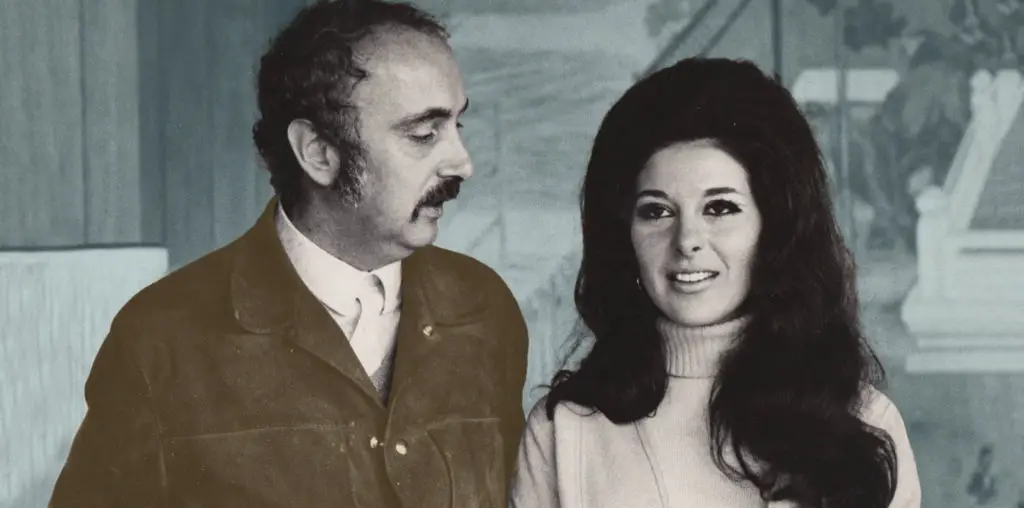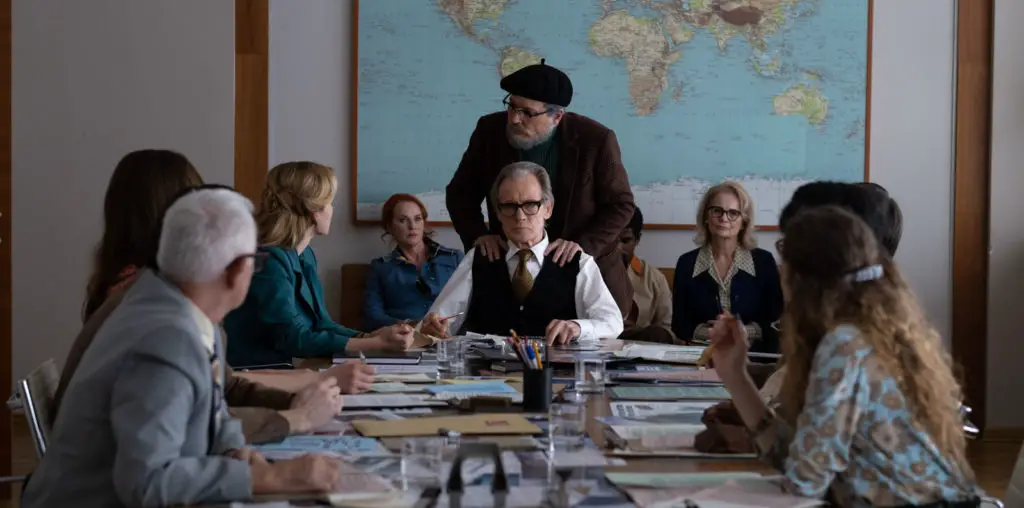
BOOTLEG FILES 153: “Submission” (2004 short film that resulted in the murder of filmmaker Theo van Gogh).
LAST SEEN: Available for viewing at several web sites.
AMERICAN HOME VIDEO: None.
REASON FOR DISAPPEARANCE: The threat of violence against those connected with its presentation.
CHANCES OF SEEING A DVD RELEASE: Very unlikely.
Muslim fundamentalists are not famous for their self-effacing sense of humor or their laid-back attitude to the world around them. Admittedly, they tend to overreact to any criticism or perceived criticism of the basic tenets of their culture and theology. One of the most brutal examples of this occurred on November 2, 2004, when Dutch filmmaker Theo van Gogh was murdered on an Amsterdam street by a Muslim fundamentalist.
The crime was centered on the fury that many Muslim extremists felt over van Gogh’s short film “Submission,” which dared to question how certain Koranic passages led to the parochial Islamic culture’s view that abusing women is ordained by Allah.
For Americans, the news of van Gogh’s murder came in two reactions. There was the initial shock that a terrorist act would be committed against an artist who was exercising his legal right to free expression. And then there was a bit of confusion: who was Theo van Gogh and just what was his film “Submission” all about?
As his name would suggest, Theo van Gogh came from a famous family – he was the great-great-grand nephew of that guy from the Don McLean song. In his own career, van Gogh was a minor figure within Dutch culture who was known for writing rude political columns and creating films designed to challenge the sensibilities of Dutch audiences – which was no mean feat, given that nation’s excessively liberal social environment. Outside of the Netherlands, however, van Gogh was virtually unknown. In America, his films were not available except for the dull 1994 feature about phone sex called “1-900.”
From his perspective, van Gogh was bothered by the large influx of immigrants who were flooding the Netherlands from Islamic countries. His concern was rooted in a serious culture clash: the Muslim immigrants, he felt, were refusing to assimilate into Dutch society and were bringing their ultra-conservative traditions into a country that was known for progressive attitudes. Sadly, van Gogh’s expressions of concern often veered into puerility – most infamously in a newspaper column where he called the Muslim community “goatfuckers” – and his credibility was diluted accordingly in many circles.
In early 2004, van Gogh entered into an artistic collaboration with Ayaan Hirsi Ali, a Somalian-born Dutch parliamentarian who created her own brand of controversy by publicly disavowing her Muslim faith (a blasphemy under Islamic tradition). Together they scripted a short film designed to highlight the state of women under Muslim extremism, with the specific challenge of questioning the interpretation of the Koran’s passages on how men can treat their wives and daughters. The resulting film was titled “Submission,” which is the English translation of the Arabic word “Islam.”
“Submission” only runs 11 minutes, yet it is a striking and provocative short that mixes an artistic avant garde style with a harsh critical attack on a culture of Islamic misogyny. The central character is a woman whose face is covered in a black veil, but whose naked body can be seen through a semi-transparent shroud. The woman begins with Arabic prayers, then abruptly switches to English to begin a series of interconnected monologues. The woman takes on the persona of four different personalities: an adult woman flogged for adultery, a teenager forced her into an arranged marriage, a wife who suffers abuse by her Koran-inspired husband, and a girl whose molestation by her uncle results in pregnancy. In each story, she speaks directly to Allah to explain how such brutality and cruelty could possibly be in sync with a peaceful religion or a divine purpose.
Through each story, “Submission” shows quick flashes of surreal imagery and sounds: the bare back of a woman covered with whip marks and Arabic calligraphy from the Koran, women crumpled in pain and defeat, bruise marks on exposed limbs, and rumbles of thunder laced with a muezzin’s call for prayer. And, of course, there are the narrator’s bare breasts beneath the gauzy robe (tits ahoy!), which is a blasphemy in the Muslim fundamentalist world.
It’s not a subtle film, by any stretch, and by Western standards it is fairly tame. However, the film was not aimed at Western audiences, but rather it was meant to provoke Muslim viewers. If its methods were harsh, nonetheless “Submission” was bold in openly questioning misogyny and a culture of violence against women because of Koranic interpretations. The questions raised in the film deserve to be asked: is it divine will to assault or kill women? Is there holiness in holding women at substandard levels, denying them the right to free will and independent thought? And ultimately, how can such a mindframe exist in the 21st century? The filmmaker’s decision in having a woman directly question Allah is, to many Muslims, a broad attack on the male-dominated theological power base.
“Submission” was broadcast on Dutch television on August 9, 2004. Dutch subtitles were used for the English narration, but not for the Arabic prayers; why van Gogh didn’t bother to offer a Dutch narration is strange, since the woman’s mouth is never shown and the film could’ve easily been dubbed into any language. The film created a major controversy among the Muslim community in the Netherlands, and van Gogh and Hirsi Ali received death threats. However, van Gogh was unconcerned (he reportedly boasted: “Who wants to kill the village idiot?”). The duo began preparing a second short that focuses on the Islamic man’s viewpoint of women.
But the second film was never made. Mohammed Bouyeri, the Dutch-born son of Moroccan immigrants, shot van Gogh with eight bullets outside of the filmmaker’s office. He then slit the filmmaker’s throat and stabbed his torso with two knives. One knife had a five-page note attached to it that promised to kill Hirsi Ali while threatening Western governments and Jews (dont’ ask how the Jews got dragged into this). Bouyeri was later captured by the police.
A week after van Gogh’s death, “Submission” was broadcast on Danish television. It was later broadcast on Italian television in May 2005. But beyond that, the film has not been given a proper release. It was withdrawn from a film festival in Rotterdam and other festivals, obviously not eager to be targeted by Muslim extremists, were not clamoring to screen the film. The film’s production company, Column Pictures, has since withdrawn the film from circulation and will not allow it to be officially shown.
But “Submission” can be seen via the Internet. Unauthorized copies of the film that were videotaped from its European broadcasts are easily found on several web sites, and it continues to have relevance in the face of rising violence from Muslim extremists.
The death of Theo van Gogh and the withdrawal of “Submission” from official release is a tragic statement on how fanatics can use violence to impose their intolerant will on a tolerant society. Over at the Vatican, Pope Benny (who has seen his own share of problems with the Islamic world) probably said it best: “May the Eternal One, our Father in heaven, bless every effort to eliminate from our world any misuse of religion as an excuse for hatred or violence.” And let’s add a bit about misusing religion to keep movies out of release. Amen!
IMPORTANT NOTICE: The unauthorized duplication and distribution of copyright-protected material is not widely appreciated by the entertainment industry, and on occasion law enforcement personnel help boost their arrest quotas by collaring cheery cinephiles engaged in such activities. So if you are going to copy and sell bootleg videos, a word to the wise: don’t get caught. The purchase and ownership of bootleg videos, however, is perfectly legal and we think that’s just peachy! This column was brought to you by Phil Hall, a contributing editor at Film Threat and the man who knows where to get the good stuff…on video, that is.
Discuss The Bootleg Files in Back Talk>>>


the short movie is really boring, and the making is quite limited
and what for? l don’t think women are better off in the western world….Things like rape etc happen every where..l am not a muslim !